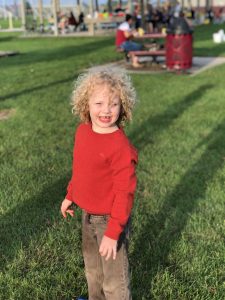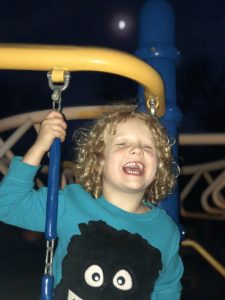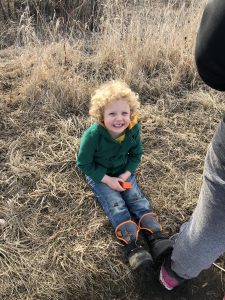We may earn money or products from the companies mentioned in this post. This means if you click on the link and purchase the item, I will receive a small commission at no extra cost to you ... you're just helping re-supply our family's travel fund.
This post was sponsored by Landscape Structures as part of an Influencer Activation for Influence Central and all opinions expressed in my post are my own.
The same week he attended preschool for the first time, my son was diagnosed as having Sensory Processing Disorder (SPD). We had suspected sensory issues for a while now, but the juxtaposition between him and his peers was hard to ignore. I am still not sure who cries more – my son, his teacher, or me. It’s not easy dealing with a child who has SPD, but I love him more than life itself.
Prior to his birth, I enjoyed an incredible amount of neurotypical privilege with two older children who always smashed the growth and development charts. The world we live in? It was made for those who are neurotypical. Fluorescent lights, warm (but itchy) wool sweaters [and clothes in general], hard church pews, careers, and just about anything else you can think of. Most playgrounds cater to those who are neurotypical, too. I’ve found a resource that helps parents find playgrounds catering to every age and ability – more on that later.
My son, with big, beautiful blue eyes and long curly hair – the type of hair that makes little old ladies stop and ask if they can touch it – is differently abled. In a world where people are judged by their inabilities rather than their abilities, my mind raced with visions of him being excluded from future birthday parties, improperly scolded for things he literally cannot control, and lots of uncertainty. Oh, the uncertainty. The what-if’s.
I didn’t just suddenly become an SPD mom – I have been one since his birth. We just now have an official diagnosis. For this diagnosis, I am grateful. I am able to arm myself, his teachers, and others with an arsenal of strategies and support. This means weekly occupational therapy visits, IEP’s with AEA, daily notes from his teachers about his behavior, sensory toys, weighted blankets, and more. We have to think one hundred steps ahead now – strategic maneuvers to ensure as minimal disruption in his routine as possible.
We are learning so much – every single day.
Some days are more successful than others.
Days riddled with…
- Pure exhaustion, frustration, and anger when getting the side-eye from moms in the drop-off line.
- Having to pick him up from the field trip that all of the other kids got to enjoy because he was unable to cope.
- Educating his teacher that it’s okay if he dips his snack in his drink because it’s a texture thing for him, and having to replace box after box of crayons because he breaks them when he needs sensory input.
Other days? So many victories:
- Reciting entire songs he learned just that day in school.
- When we can drop him off at preschool and pick him up without incident.
- Getting his school picture back and he looks happy (how in the world did they get him to sit still for a picture?).
Even on his worst days at school, he always shouts, “I HAD A GOOD DAY AT SCHOOL, MAMA!” as he throws his hands up in the air. What the teacher might consider a bad day? Didn’t even phase him. He loves school and loves his teacher.
I know that it’s not easy dealing with a child with SPD. Because it is Sensory Awareness Month….From one SPD mom to you, neurotypical mama – I wish I could tell you:
- Teach your children to have compassion for those who are differently abled. Recognize their abilities and have empathy. The best way to teach this to your children is for you to model this behavior yourself. You taking a leadership role on this will help more than you will ever know.
- My child isn’t naughty, bad, or misbehaved. He is unable to self-regulate and when his “wires get crossed” internally – this results in sensory overload. You see this as “tantrums” and “meltdowns” – please be patient with him because he is struggling to communicate his needs to you. Sometimes these “wires get crossed” in what you consider the most trivial ways – for example, an itchy tag on his shirt, his neighbor with a loud coat zipper, jeans are always a no-go (no matter how loose – he says they are strangling his body), and a coin not fitting into a hole. At home, he is butt naked. This often results in him being butt naked in our fenced backyard. Most of the neighbors find this hilarious – but there is another who built a six foot tall privacy fence after telling my husband this was not okay (despite Christian being a 4 year old child with SPD). Sigh. I choose my battles.
- Change is the only constant, and a child with SPD often struggles with any kind of change in routine. His entire life, he is taught rules by which to live by. You consider it common sense, but my son relies on these rules to function throughout his day. He knows that he is supposed to hang up his backpack, wash his hands, and then find a seat at his table. When the next day he is told he has to sit at a specific table and not the one he sat at the day before, he has to re-learn the rule that he needs to sit in a specific spot. This can be incredibly frustrating to him – this rule that he learned no longer applies. He doesn’t understand why that rule doesn’t apply in this circumstance, but does in others. The result? Meltdown. Think of it like a computer – if you are giving the computer the wrong information, it goes haywire.
- Talk to differently abled children as you would any other child…but go a little further. He deserves your respect and admiration just like other children…but he thrives on positive affirmation – often. He does so much better being told what he did well rather than what he did wrong. The last thing he needs is punitive consequences – let him participate and when you focus on what he does well, he will try very hard to keep doing it. He loves praise!
- Be inclusive. Yes – my son is not like other children. However, he so desperately wants to take part in things. Invite him to birthday parties and playdates. An open place, like a playground, is great for this. Landscape Structures is the leader in creating sensory-friendly playgrounds – a quick search will show you so many of these playgrounds all over the country. A sensory-friendly playground will be fun for every age and every ability.


Has this opened your eyes? Is there anything you would add?


Leave a Reply